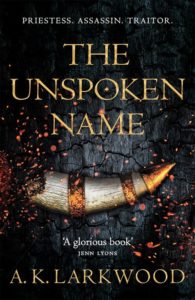Portals. It had to be Portals.

Portals are nothing new in fantasy, Doors to other worlds with tenuous or not so tenuous relations with each other is older than Narnia. Older still, if you want to count stories of Faerielands. But having a sheaf of portal-connected worlds is younger, and it’s a tricky business to pull off. Many Portal fantasies rely on bringing the protagonists across to the other world and letting the culture, sociological and other clashes do the heavy lifting. Lots of Portal fantasies have a Urban fantasy root, the characters coming from our world into the alternate one. This is part of the recent resurgence in Portal fantasies of this type ranging from Seanan McGuire to Foz Meadows to Edward Lazellari.
A Portal fantasy that takes place entirely in secondary worlds is a somewhat different beast. You can find it in roleplaying games–take Sigil, City of Doors. Or the Forgotten Realms, lousy with Portals. But secondary world fantasy novels with portals to other worlds–lots of other worlds, is a rarer beast, and a more difficult trick to manage. Describing one secondary world and its environs, characters, quirks, and nature is hard enough in the limited space of a novel. Multiple worlds is a more difficult trick entirely to manage. Not impossible (Hello Chronicles of Amber. Hi there For the Killing of Kings) but notable even for the attempt.
And so we come to The Unspoken Name by AK Larkwood. Debuting with a big fat epic fantasy novel with Portals doing some interesting and unexpected things along the way is a pretty high bar to clear.
The story of The Unspoken Name revolves around a quintet of major characters. At the center of the novel, and our primary viewpoint for most of the novel is Csorwe. When we meet her, she is about to undergo a momentous occasion–her sacrifice. For, you see, Csorwe is a priestess in the religion of The Unspoken One. In the midst of their duties (which include acting as an Oracle), every year, one Priestess is chosen to travel up the mountain and sacrifice herself to the Goddess. This year, Csorwe’s been given that honor as ‘Bride’.
So, when a Mage, Belthandros, comes to the House of Silence and, after using her ability as a Oracle regarding a Lost Goddess, offers Csorwe a way out of becoming a blood sacrifice, she takes the opportunity. In accompanying him, Csorwe is caught in the coils of intrigue and adventure as one of her fellow priestesses, the Librarian Oranna, decides to get in on the action. Along the way she meets another would be employee of Beltandros (Talasseres) and finally meets Shuthmili, a talented magical adept whose mapped out future has resonances with the future that Csorwe faced herself.
Oh, did I mention Csowe’s an orc? And that in aligning herself with the Mage, she multiclasses as an assassin and warrior to her skills as a Priestess?
The novel is brimming rich with everything I want in a fantasy novel in 2020. That complex web of characters with agendas, opinions, relations, struggles, and more with each other alone would sustain a fantasy novel, and it is but one of the engines that makes The Unspoken Name hum. The characters relationships with each other evolve, change, grow, are by turns prickly, considerate, thought provoking and touching. There is a queer romance that blooms, (The novel in general is very queer friendly), rivalries to hash out, unexpected allying and betraying and it all drives wonderfully
The worldbuilding is top notch and fascinating. How does one depict a sheaf of alternate worlds that have relations, conflicts, trading and routes to each other? Larkwood arranges them all logically with her portal system, giving an overall structure to her many worlds. With the economy and excellent writing, the various worlds and locations depicted all come to life, from The Unspoken One’s shrine, The House of Silence, to the trading city of Grey Hook, to the central hub of Tlaantothe, and many others seen in the course of the novel. It’s a polyglot and multispecies set of worlds, with the author delighting in her invention when it comes to names, languages, cultures, and more. We get ancient ruins, political machinations, set piece battles, and lots more.
The novel is the kind that has a dramatis personae and a pronunciation guide up front. And I didn’t even mention there are Gods, lost Gods, ancient magics, multiple current magical systems wielded by various characters, and lots of interplay in between all of these elements. And even for that economy of writing in how she brings it to life, Larrkwood’s writing brings all of these places and locales into vivid relief with each other and within themselves.
There are pauses for breath, but there is not a lot of reflection to be had in the pages. Csorwe can be a rather blunt instrument, and since we are in her heard for much of the novel, that means the book is light on luxuriating in a particular world or locale, but rather turning it and the situations to the plot. And the plot, which slowly and carefully unfolds in the course of the novel is like a burning fuse with multiple bombs, revelations and game changers.And it goes all back to those character beats. Thje plot is strongly focused and grounded on what characters do, and why. And it’s a self reinforcing cycle as well. Larkwood relies on that relationship map to “catch” the characters after the latest change in events, and use those relationships to forge new ways forward and new subsequent changes in plot, and locale. And it flows wonderfully. Chases, escapes, combats physical and magical, explorations,plenty of action and adventure provide action beats that propel the narrative. . The ultimate revelations of the overall plot, too, when they are revealed, are striking and excellently revealed, and in the end it all comes together expertly.
The Unspoken Name is a hell of a debut, and beyond that, a hell of a fantasy novel. More, please!







